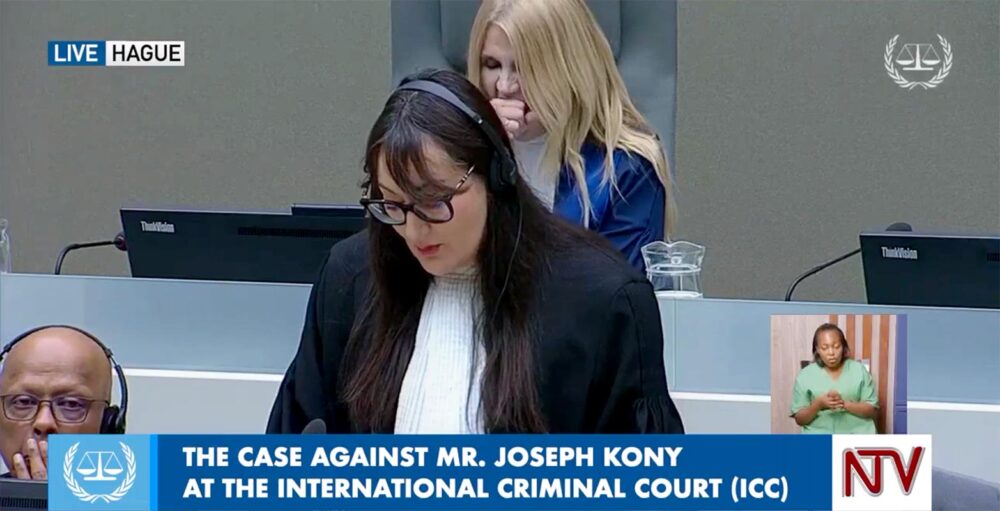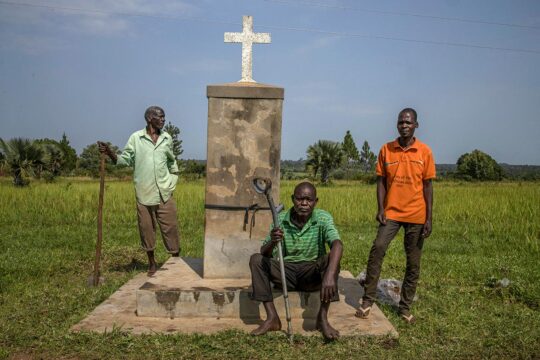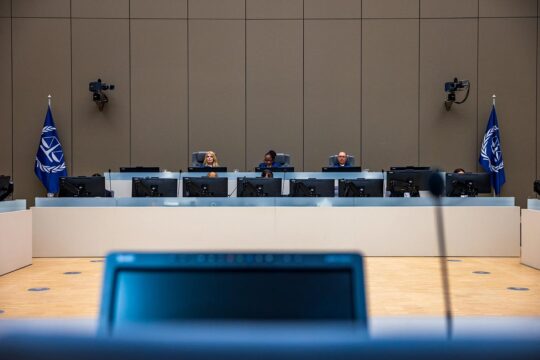In his closing remarks at the end of a the two day hearing in The Hague, after all the description of horrific crimes and how Joseph Kony should be held responsible, defence counsel Peter Haynes told the court that when the prosecution first proposed an in absentia confirmation hearing in this case, it had justified the proposal in part as a way to “air the evidence, to give the victims a chance to speak. And to increase public awareness”.
He submitted that the publicity around the hearings meant that those objectives had been met, and that the judges “should issue a conditional stay of proceedings and discharge my mandate as counsel”. He had outlined during the previous day the uncertainty as to what would happen if the suspect were arrested from this point on. Would these proceedings be held again, with the same charges? Would there be a new legal team? Would Uganda – if they arrested Kony – hand him over? As Jackline Owacgiu Atingo, researcher at Ghent University Belgium, who watched the proceedings in Gulu says, “it’s a very rare case. A hearing in the absence of somebody is something that people here have never experienced. People do not understand exactly what’s happening. Is it just going to be in vain?”
“No description of the accused”
Of course, there is never any guarantee that a case will proceed. The same team that defended Kony have managed previously successfully to overturn the conviction of Congolese Jean-Pierre Bemba. At any stage, judges can decide not to continue. Even the prosecutor can acknowledge that he doesn’t have the evidence – as was the case in the Kenyan case before the ICC. But all through these hearings against Kony, the questions were ever present; who is this for, what will it achieve and what does it mean?
“There was no description of the accused,” noted Adina-Loredana Nistor, lecturer at the Vrije Universiteit Amsterdam, who watched from the public gallery. She has researched in northern Uganda and written on the only Uganda trial at the court, against Kony’s lieutenant, Dominic Ongwen, which concluded this year. “If I think of the Ongwen trial, you had the prosecution opening and saying: Dominic Ongwen was both good and bad and good people are capable of evil things”. At Ongwen’s trial, “Kony was described as an omnipotent person,” and the LRA was seen “so steeped in mysticism,” says Nistor, “it created a certain atmosphere”. In the Kony hearings “spirituality was mentioned only once, very briefly”.
Kony’s role though, was referenced again and again over the two days. The prosecution outlined the command structure of the LRA. He was known as chief commander. In a multi-coloured chart about ten other men were shown to have been promoted or demoted as commanders during the specific period of the charges – 2002-2005 – while Kony remained on top. “A very interesting play with time, with past, present and future, because the defendant has not been apprehended. Maybe he will be”, says Nistor.
Focus on women and children
There are 39 charges against Kony, detailed by a prosecution team led by deputy prosecutor Mame Mandiaye Niang.
“The LRA forcibly abducted thousands of people and enslaved them during the period covered by the charges. The abducted women were subjected to multiple forms of enslavement. They were forbidden to leave the LRA. Partners were imposed on them. They were subjected rape and other forms of sexual violence. They were subject to reproductive control, including forced pregnancies. Which forced them to give birth in the bush without prenatal or postnatal care. And they were subjected to exploitation, aggravated by labour in conditions of domestic servitude. Within the LRA, these women were referred to as wives, a euphemism for forced conjugal partners. Domestic slaves. Children were not spared either. Kony abused their innocence, as well as their inexperience, to swell the ranks of his army. He set up a veritable army of child soldiers,” he told the court.
The focus on what happened to women and to children provided the backbone of the charges. Prosecuting counsel Sanyu Annabelle Ndagire outlines that “the LRA unlawfully confined these women and girls during their pregnancies with the intent to carry out grave violations of international law, including continued enslavement. And the inhumane act of forced marriage. This included at least one of the victims’ children fathered by Kony, who was born in Uganda during the charge period. While other children of Kony were conceived and born outside of the charge period and outside of Uganda, these witnesses confirmed the existence of a pattern of forced pregnancy with which Mr. Kony is charged”.
Evidence from Ugandan armed forces
Some of the prosecution evidence, Ndagire says, came from intercepted radio communications, transcribed by the Ugandan armed forces. “The LRA radio communication of 18 December 2002 reveals that Kony ordered the beating of a woman with 50 strokes for refusing to hand over a young child as a babysitter or TingTing [young girl],” Ndagire told the court.
The prosecution clearly made strategic choices, says Nistor. “These are also the crimes that you can prove, and you know for sure that you have sufficient evidence to back up your claims”. She underlines that Kony faces fewer charges than Ongwen – “he started with 70 and was convicted of 63, so Kony starts with a bit over half. I wonder how that makes sense”. “What seems left unaddressed is sexual violence against boys. In the Ongwen trial during his unsworn statement, he said that he was sexually abused by female commanders. I would have expected that the prosecution would build on that from the Ongwen trial”.
Jackline Atingo is also concerned. She has long noted that the ICC can only deal with crimes committed after its inception in 2002. “How about those who were abducted and those who had issues in 1992 and 1993, their children were killed, houses were burned. What is going to happen? Some crimes seem more important than others. And yet all of them are crimes that have hurt the population and have hurt people”. “Victims’ expectation was that Kony is going to be accountable for all the victims”.
“The ICC is seen as very unfair. Has justice been done to everybody? Has justice been done?” In particular, she says “we have children that were born in the bush or when their mothers were held captive with the LRA. And then they came back with these children and, there’s no land for them to settle in. They have been rejected by, you know, the community. How can the hearing benefit them? How are they going to benefit from this?”
“What is it that ICC wants?”
Nistor reflects that “within the same community, you will find people who are very satisfied, who were expecting for this moment to happen and others who are extremely disappointed”. People have told her that without this confirmation of charges, maybe people would forget about transitional justice for the crimes committed in the war between Uganda and the LRA. “So, the conversation stays open. Some were also hoping that the crimes of the government would be brought to the fore again”.
For Atingo, “at the end, this hearing will cause victims a lot of distress. I don’t want to use the term trauma, but distress at the end because maybe, they will lose trust”. She explains that sometimes it’s difficult for observers in northern Uganda to understand what it is that ICC wants, which can lead to mistrust of its motivation behind the hearings. “Is it employment that they are looking for to continue existing?”, some end up wondering.








